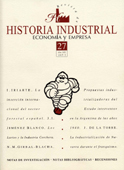Algodón, envases textiles y tejeduría doméstica. Propuestas industrializadoras del estdo interventor en la Argentina de los años 1940
Palabras clave:
Argentina, Algodón, Intervencionismo, TejeduríaResumen
Este estudio histórico analiza las características de las propuestas industrializadoras surgidas en los años que preceden a la llegada del peronismo al poder, para conocer sus alcances, su finalidad y los resultados conseguidos, como una expresión más de la relación entre la predominante economía agraria pampeana y las producciones agrícolas no competitivas propias de las regiones marginales. En tal sentido la tejeduría doméstica en relación con los envases para productos rurales, se convierte en un interesante estudio de caso. El objetivo es avanzar en la caracterización de las continuidades y cambios de la Argentina rural a través del conocimiento de la política agraria y agroindustrial impulsada por el Estado interventor durante las décadas de 1930 y 1940, para ampliar las interpretaciones acerca de la relación entre el Estado y la burguesía agroindustrial argentina.Descargas
Descargas
Publicado
Cómo citar
Número
Sección
Licencia
El/la autor/a cede los derechos al/la editor/a. Creative Commons
El/la autor/a que publica en esta revista está de acuerdo con los términos siguientes:
- El/la autor/a cede en exclusiva todos los derechos de propiedad intelectual al/la editor/a para todo el mundo y toda la duración de los derechos de propiedad intelectual vigentes aplicables.
- El/la editor/a difundirá los textos con la licencia de reconocimiento de Creative Commons que permite compartir la obra con terceros, siempre que éstos reconozcan su autoría, su publicación inicial en esta revista y las condiciones de la licencia.





